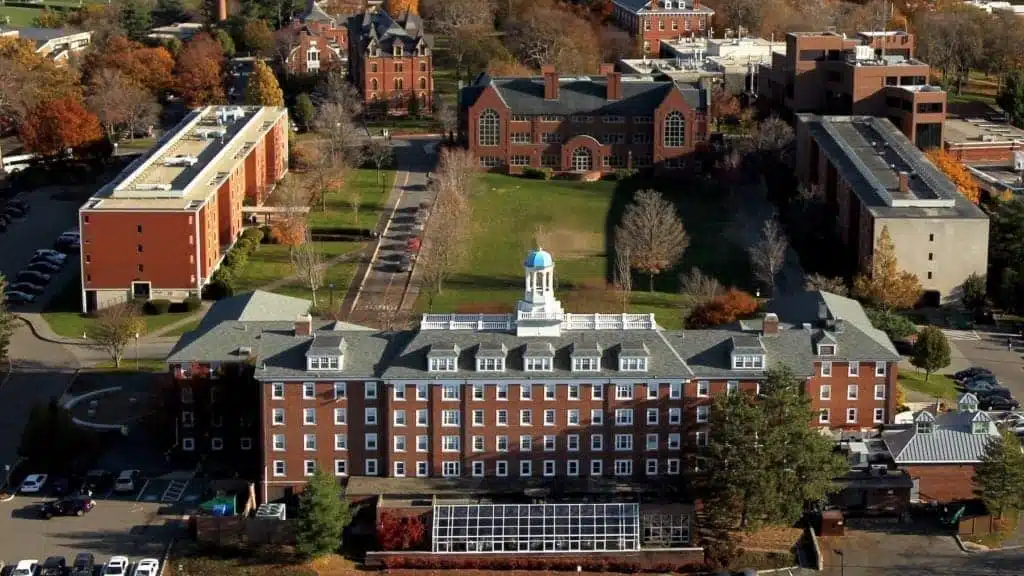Exploring Tufts Admissions Statistics
Are you interested in attending Tufts University? Do you want to know more about the Tufts admissions statistics? Look no further as we dive into a comprehensive guide to Tufts admissions statistics, process, and requirements.
What are Tufts Admissions Statistics?
For the class of 2025, Tufts University received a total of 22,725 applications. Of these, only 2,332 students were admitted, making the acceptance rate a mere 10.3%. This makes Tufts one of the most competitive colleges in the world, with an average yield rate of 41%. Over the years, the acceptance rate at Tufts has been declining, indicating the increasing competitiveness of the college.
It is worth noting that Tufts University has a holistic admissions process, which means that they consider a variety of factors beyond just test scores and grades. The admissions committee also takes into account extracurricular activities, essays, letters of recommendation, and demonstrated interest in the university. This approach allows Tufts to create a diverse and well-rounded student body, which is one of the reasons why it is highly regarded in the academic community.
Understanding the Tufts Admissions Process
The Tufts University admissions process, as reflected in Tufts Admissions Statistics, is rigorous and competitive. Each application is considered holistically, taking into account various factors such as academic achievements, extracurricular activities, essays, teacher recommendations, and interviews. The admissions committee carefully evaluates the applicant’s overall profile to assess their potential for success and contribution to the Tufts community.
The admissions committee seeks to admit students who demonstrate academic excellence, intellectual curiosity, leadership qualities, and a commitment to community service. The applicants are required to submit their SAT or ACT scores, and Tufts also offers an optional interview for prospective students.
One unique aspect of the Tufts admissions process is the emphasis on the applicant’s fit with the university’s values and culture. Tufts is known for its commitment to social justice, diversity, and global citizenship, and the admissions committee looks for students who share these values and are passionate about making a positive impact in the world. This is reflected in the essay prompts, which often ask applicants to reflect on their personal values and how they align with Tufts’ mission.

Another important factor in the Tufts admissions process is demonstrated interest. The university encourages prospective students to visit the campus, attend information sessions, and connect with current students and alumni.
This not only helps applicants get a better sense of whether Tufts is the right fit for them, but it also shows the admissions committee that they are serious about attending the university. In addition, Tufts tracks demonstrated interest through interactions with the admissions office, such as email inquiries and attending college fairs.
Overview of Tufts Admissions Requirements
The Tufts University admissions requirements are comprehensive and designed to identify the most capable and promising students. The applicants are asked to submit their academic transcripts, standardized test scores, two teacher recommendations, a counselor recommendation, and a personal essay.
Applicants are encouraged to highlight their community service, leadership, extracurricular activities, and work experience to paint a more holistic picture of their academic and personal achievements. The new test-optional policy has also been implemented by Tufts in response to the Covid-19 pandemic.
Additionally, Tufts University also considers demonstrated interest as a factor in the admissions process. This means that applicants who have shown a genuine interest in the university through campus visits, attending information sessions, and communicating with admissions representatives may have an advantage in the admissions process. Tufts also values diversity and seeks to create a diverse student body, so applicants from underrepresented backgrounds are encouraged to apply.
By taking into account Tufts admissions statistics, applicants can gain a better understanding of the competitive nature of the process. However, it is equally important for prospective students to focus on presenting a comprehensive and well-rounded application that highlights their strengths, achievements, and potential for growth in order to stand out among the applicant pool.
Tufts University Acceptance Rate: How Hard is it to Get In?
With an acceptance rate of only 10.3%, Tufts University, as evidenced by its Tufts Admissions Statistics, is undoubtedly a highly selective college. However, it’s essential to note that Tufts admissions consider applicants holistically, and students are admitted based on their overall profile. Academic achievements alone are not sufficient for admission; extracurricular activities, community involvement, and leadership qualities also carry significant weight in the admissions process.
Additionally, Tufts University has a need-blind admissions policy, which means that the university does not consider an applicant’s ability to pay for tuition when making admission decisions. This policy ensures that all qualified students, regardless of their financial situation, have an equal opportunity to attend Tufts. Furthermore, Tufts offers a generous financial aid program, which includes grants, scholarships, and work-study opportunities, to help students cover the cost of attendance.
What are the Average SAT/ACT Scores for Accepted Students at Tufts?
The average scores of the admitted students for the class of 2025 are 1505 on the SAT (out of 1600) and 33 on the ACT (out of 36). It’s essential to mention that Tufts University also has a test-optional policy. If a prospective student chooses not to submit their scores, their application will be reviewed holistically as well.
Additionally, Tufts University considers various factors beyond test scores in its admissions process. These factors include a student’s academic achievements, extracurricular activities, essays, recommendations, and personal qualities.
The university values diversity and seeks to admit students who will contribute to the campus community in meaningful ways. Therefore, while test scores are important, they are not the only determining factor in the admissions decision at Tufts University.
GPA Requirements for Admission to Tufts University
The average GPA of the admitted students for the class of 2025 was 4.20 on a 4.00 scale. However, this does not mean that a student with a lower GPA would be necessarily disqualified from admission. Tufts admissions committee takes into account the context of students’ grades, such as their school’s rigor, grade trends, and other factors. A Story of improvement and outstanding commitment to extracurriculars may compensate for weaker grades.

Additionally, Tufts University also considers other factors beyond just GPA when making admission decisions. These factors include standardized test scores, essays, letters of recommendation, and extracurricular activities. The university values well-rounded students who have demonstrated leadership, community involvement, and a passion for learning. Therefore, even if a student’s GPA falls below the average, they may still have a strong chance of being admitted if they excel in other areas.
Diversity at Tufts: Demographics of the Incoming Class
The incoming class of 2025 at Tufts University is diverse and multicultural, boasting students from all over the world. The class is comprised of 48% male students and 52% female students. Furthermore, 41% of the admitted students identify as students of color, and over 80 countries are represented in the incoming class.
In addition to the diverse racial and ethnic backgrounds represented in the incoming class, Tufts University also values diversity in terms of socioeconomic status. The university has a need-blind admissions policy, meaning that a student’s ability to pay for tuition is not a factor in the admissions decision. This allows for a diverse range of students from different economic backgrounds to attend Tufts.
Furthermore, Tufts University is committed to creating a welcoming and inclusive environment for all students. The university offers a variety of resources and supports systems for students from underrepresented backgrounds, including mentorship programs, affinity groups, and cultural centers. Tufts also hosts events and workshops throughout the year to promote diversity and cultural understanding on campus.
The Role of Extracurricular Activities in Tufts Admissions
Extracurricular activities play a vital role in the Tufts admissions process, as they provide insight into the student’s passions, character, and leadership qualities. The college expects its students to be involved in activities that align with their interests and demonstrate their ability to manage time and set priorities. These activities can range from community service, sports, research, arts, debate, and more.
Moreover, Tufts values students who have taken the initiative and created their own extracurricular opportunities. For example, starting a club or organization, organizing a fundraiser, or launching a community project can demonstrate a student’s entrepreneurial spirit and leadership potential. Tufts also recognizes the importance of work experience and encourages students to pursue internships or part-time jobs that align with their academic and career goals.
Tips for Writing a Strong Tufts Admissions Essay
Tufts University requires applicants to write a personal essay that reflects their personality, individuality, and achievements in a specific area of their choosing. Students are advised to choose topics that are meaningful to them and showcase their writing skills effectively. The essay is a chance to demonstrate a candidate’s creativity, critical thinking, and communication skills, revealing their personality and interests.
When choosing a topic for the essay, it is important to consider the prompt carefully and ensure that the topic aligns with the prompt. Applicants should also avoid writing about controversial or sensitive topics that may offend the admissions committee. Instead, they should focus on topics that highlight their strengths and achievements.

Additionally, it is important to proofread the essay carefully and ensure that it is free of grammatical errors and typos. Applicants should also consider seeking feedback from a teacher, counselor, or mentor to ensure that the essay is well-written and effectively communicates its message. By following these tips, applicants can increase their chances of writing a strong Tufts admissions essay that impresses the admissions committee and helps them stand out from other applicants.
Interview Process for Tufts Admissions
Tufts University offers an optional interview for prospective students. The interview is an opportunity for potential students to convey their personality and character and get additional information about the school. Tufts offers an opportunity for candidates to interview in person, online, or with an alumni interviewer. If a student wishes to have an interview, Tufts University will make every effort to arrange for one.
During the interview, the interviewer will ask questions about the student’s academic background, extracurricular activities, and interests. The interviewer will also provide information about Tufts University and answer any questions the student may have. The interview is typically 30-45 minutes long and is conducted in a conversational style.
It is important to note that the interview is optional and not required for admission to Tufts University. However, students who choose to participate in an interview may have an advantage in the admissions process, as it allows them to demonstrate their interest in the school and their fit with the Tufts community.
Financial Aid and Scholarships at Tufts University
Tufts University prides itself on being need-blind, meaning that the college’s admissions committee does not take into account a student’s financial situation during the admissions process. Tufts meets the full demonstrated financial need of all admitted students by offering need-based aid packages that could include grants, loans, and scholarships. The college also has a merit-based scholarship program for students with exceptional academic achievements and extracurricular activities.
In addition to need-based and merit-based aid, Tufts University also offers work-study programs to eligible students. These programs provide part-time employment opportunities on campus or with off-campus community service organizations. Students can earn money to help pay for their education while gaining valuable work experience and contributing to their community.
Furthermore, Tufts University commits to reducing student debt. The college has implemented a loan cap program, which limits the amount of loans a student can take out each year. This program helps to ensure that students are not burdened with excessive debt after graduation and can pursue their career goals without financial stress.
Future Trends in Tuft’s Admissions Process
The Tufts admissions process constantly evolves, adapting to changes in the college education landscape. With the recent test-optional policy, there could be more emphasis on extracurricular activities and community service in the admissions process. Furthermore, Tufts Admissions Office is proactively hiring more admissions officials to accommodate the increasing number of applicants.

Overall, Tufts University is a highly sought-after institution that has a rigorous admissions process. With a holistic and comprehensive approach to admissions, Tufts University is keen to admit students who showcase their passion, character, and academic excellence. If you want to be part of a diverse, engaged, and motivated community, Tufts University should undoubtedly be on your list.
One of the future trends in Tuft’s admissions process is the increasing importance of demonstrated interest. This means that Tufts will be looking for applicants who have shown a genuine interest in the university through attending information sessions, visiting the campus, and engaging with Tufts’ social media channels. This trend is in line with the university’s desire to admit students who are a good fit for the Tufts community and who are likely to thrive academically and socially.
Another trend likely to shape Tufts’ admissions process in the future, as indicated by Tufts Admissions Statistics, is the increasing importance of diversity and inclusion. Tufts University is committed to creating a diverse and inclusive community, and this commitment is reflected in the admissions process.
In the future, Tufts is likely to place even greater emphasis on recruiting and admitting students from underrepresented backgrounds and on creating a campus culture that is welcoming and supportive of all students, regardless of their race, ethnicity, gender, or sexual orientation.
If you’re set on getting into a world-class college but aren’t sure how to make it happen, we can help! AdmissionSight is a leading college entrance expert with over a decade of experience helping students just like you get into the schools of their dreams.
At AdmissionSight, we focus on offering a wide range of services, all aimed at helping students perfect their applications to catch the attention of admissions officers. Contact us today to schedule a free consultation to learn more about what we offer.





































